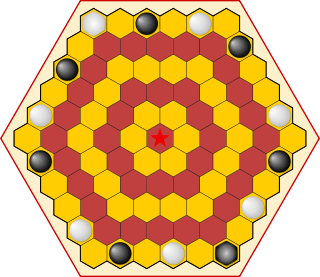Agon (game)

Agon (or Queen's Guard, Queen's Guards, Royal Guards) is a strategy game for two players, played on a 6×6×6 hexagonal gameboard.
Agon may be the oldest board game played on a hexagonally-celled board, first appearing in France as early as the late eighteenth century. The game reached its greatest popularity a century later when the Victorians embraced it for its blend of simple rules and complex strategy.
Rules
Each player has one queen and six guards. Players determine who moves first, then turns alternate. On each turn, a player moves one of his pieces. The object of the game is to be first to maneuver one's queen to the central hex (the throne) at the center of the board, and surround her with all six of her guards.
Moves
The gameboard may be thought of as a series of concentric rings of hex cells (highlighted by rings of alternating colors). Pieces move one step at a time to an adjacent cell, either sideways in the same ring, or towards the throne to the next ring. The cell moved to must be vacant. Only the queen may move to the throne.
Captures
A piece is captured when two enemy pieces are on adjacent sides of it, in a straight line. The player whose piece is captured must use his next turn to relocate the captured piece:
- If the captured piece is a guard, the owner must move it to any vacant cell of his choosing on the outer board ring.
- If the captured piece is a queen, the owner must move it to any vacant cell on the board.[note 1]
If more than one piece is captured in a turn, the player whose pieces were captured must move them one turn at a time. If one of the pieces captured was the queen, it must be moved first. If more than one guard was captured, they can be moved in any order.
Other rules
- If a player surrounds an empty throne with his guards, then neither player will be able to form the winning configuration, and that player forfeits the game.
- It is not allowed to move a piece between and adjacent to two enemy pieces, in a straight line.
- If a player touches one of his pieces he must move that piece, or forfeit his turn.
Variation
The game starts with only queens, in opposite corners of the board. Players place their guards, one per turn, on any vacant board cells (except the throne). After all twelve guards have been placed, the game proceeds under normal rules.
Sets
Eugene Provenzo's Favorite Board Games You Can Make and Play gives detailed plans for making Agon sets. Versions of Agon are published by Waddingtons Games, House of Marbles and Kruzno.
See also
References
- ↑ A different rule is described in The Way to Play: the owner must move his captured queen "to any vacant square that his opponent requires" (Diagram Group 1975:35).
Bibliography
- Diagram Group (1975). Midgley, Ruth, ed. The Way to Play. Paddington Press Ltd. pp. 34–35. ISBN 0-8467-0060-3.
Further reading
- Bell, R. C. (1979) [1st Pub. 1969, Oxford University Press, London]. Board and Table Games From Many Civilizations. II (Revised ed.). Dover Publications Inc. pp. 61–63. ISBN 0-671-06030-9.
- Bell, R. C. (1983). The Boardgame Book. Exeter Books. pp. 40–41. ISBN 0-671-06030-9.
- Parlett, David (1999). The Oxford History of Board Games. Oxford University Press Inc. pp. 146–47. ISBN 0-19-212998-8.
- Provenzo, Eugene. Favorite Board Games You Can Make and Play. Dover, 1990. ISBN 0-486-26410-6.